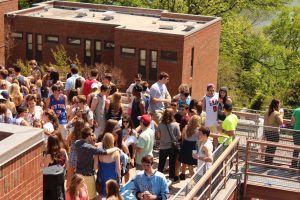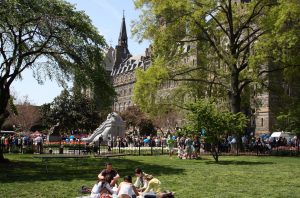Friday, April 28, marks the 22nd Georgetown Day. Today, Georgetown Day is characterized by daytime parties and programming to celebrate the end of classes—but underneath the revelry, the day has a tragic past most Hoyas don’t know about. Each year, university officials attempt to remind students that the day is more than the festivities it has become: It began “in 2000 as a response to a year with several painful hate crimes and the tragic death of a student involving drinking,” according to an email Georgetown Student Affairs sent to the community on April 19.
The tragic death refers to the loss of David Shick (MSB ’01) in February 2000. The incident is mythicized in the Georgetown community, with rumors attributing Shick’s death to alcohol poisoning or a bad fall down the Lauinger Library steps. Moments recalling his death, like the April 19 email, do not often mention violence. The history of Shick’s death, the nontransparent university response, and the disinformation that ensued are all important for reckoning with the meaning of Georgetown Day over two decades later.
“It was not alcohol that killed David, but a senseless act of violence,” Shick’s family wrote in a letter to the Hoya on April 26, 2000.
Shick was from New Jersey, and had friends and a girlfriend who loved—and still love—him deeply. On Friday, Feb. 18, 2000, Shick and his friends were returning to campus from a sports bar, Champions, at 2:30 a.m. They ran into a group of men’s soccer players in the library parking lot, and a physical altercation broke out after Shick and one of the athletes bumped into each other.
“There was just an exchange of hubris, you know, ego, like what the heck? Swears being thrown around: ‘Why’d you bump me?’” Erin Flynn (MSB ’01), Shick’s girlfriend, said. “The first punch came from [the perpetrator], as an uppercut to Dave. So, like, knocked him back off his stability and he fell back and hit his head, like the base of his head on a curb that was in the parking lot.”
Witnesses quoted in Hoya articles from the time describe a horrific scene in which Shick was abandoned by his attackers. “A lot of people took off,” an anonymous witness recounted to the Hoya. GUPD then arrived at the scene minutes after a 911 call placed by a passing pizza delivery driver. Shick was sent to MedStar Georgetown University Hospital, where he passed away four days later, on February 22, 2000.
“I didn’t think he was going to die,” Flynn said. “He was taken from us far too soon and he was a person with so much promise. Where would his life have gone? Would he and I have gotten married?”
The two students who assaulted Shick—one who threw the first punch and another who was involved in the altercation—leading to his death received no legal repercussions and nearly no sanctions on campus. In the end, the main perpetrator only had to write a short reflection paper. Their names were never publicized thanks to the university’s privacy policy.
Shick’s cousin, Tiffanie Benfer, who then worked at Georgetown as judicial coordinator and assistant director of student conduct, recounted that within minutes of Shick’s death, one of her coworkers in the hospital began asking questions about who threw the first punch. “Basically saying he had a role in his own death,” Benfer recounted.
“A person lost his life. A family will never be the same. Two parents lost their child. A brother and a sister lost their brother. All these people who loved Dave lost a loved one. That got lost,” Flynn said. “Instead, it became all about covering up and protecting the reputation of the university and of the two students who were responsible.”
What ensued was a lack of university communication about the true nature of the incident, leading to a series of misconceptions about Shick’s death—among them that he was a frequent heavy drinker. “There was then this whole slandering that went along with that of character witnesses painting him out to be a drunken, belligerent, bar-going type of guy who was predisposed to this type of behavior. And that just simply wasn’t true,” Flynn said.
These misconceptions and gaps of knowledge around Shick’s death led student media outlets to fill in these gaps in a way that highlighted a passive narrative—focusing on his fall—rather than an active one that retained culpability.
“A Georgetown junior died Tuesday afternoon after sustaining a head wound from a fall in the Lauinger library parking lot,” a Hoya article from 2000 wrote, noting that “alcohol was involved.” Furthermore, while articles from the time mention that Shick “sustained injuries,” none explicitly wrote that such injuries were the direct result of another student.
The coverage of Shick’s death in the Voice was even more limited than in the Hoya; while the Voice wrote several substantive articles about the university’s response in 2002, the publication failed to substantively cover David’s death in 2000.
Two years later, after a similar violent incident brought comparisons to Shick’s case in student publications, former professor Colin Campbell wrote a letter to the Hoya alleging that the GUPD officers at the scene allowed remaining witnesses to disperse without taking names or statements and immediately declared the event an accident.
In an attempt to investigate Campbell’s claims this year, the Voice reached out to GUPD for information.
“This happened 23 years ago,” Frank Rosenberg, a current GUPD detective, told the Voice. “We don’t have any records and they haven’t maintained records from that long ago.”
GUPD’s evidence retainment has remained a problem; recently, evidence was lost in the investigation of the hate crime committed against LaHannah Giles (CAS ’23) due to what GUPD and university administrators described as an “unexpected server failure.”
According to a university spokesperson, “Georgetown University complies with all relevant federal and local laws and requirements and cooperates with law enforcement on criminal matters. In this case, the Metropolitan Police Department (MPD) and the U.S. Attorney’s Office conducted the criminal investigation. GUPD provided its confidential incident report to the lead investigatory agencies.”
The lack of accessible documentation makes it difficult to verify Campbell’s claims. This dearth of publicly available information from GUPD and MPD further creates misconceptions about what happened, thus misconstruing Shick’s story in the collective memory.
MPD forwarded the case to the U.S. attorney’s office, as is procedure when someone dies. After a two-week-long grand jury hearing, the D.C. prosecutor decided not to pursue prosecution. “[The prosecutor] said we can’t pursue it because of the level of alcohol that was involved, the credibility of the witnesses has been diminished,” Flynn said.
“If you’ve got alcohol involved, it makes it harder to go after cases … because you have to demonstrate intent,” Benfer said. The family has, thanks to the court proceedings, become somewhat of an expert in the field; Benfer is now a lawyer.
Although no criminal proceedings arose, Georgetown still had to settle the case internally through student disciplinary action. When a student is charged with a grave disciplinary matter, their case goes before a hearing board composed of three undergraduate students and two faculty members, which decides whether a student is responsible based on a “clear and convincing standard.” If found culpable, they are then sanctioned by the Office of Student Conduct (OSC).
The OSC initially planned to bar Shick’s parents from attending the hearing, but eventually allowed them to sit in. They were, however, not allowed to obtain legal counsel to represent them in this process and had little to no influence over the hearing.
“That was back then, you had no say in it at all,” Benfer said. The student who was involved in Shick’s death obtained the legal defense of David Schertler, a prominent criminal defense attorney in D.C., and brought him to the campus hearing.
After the summer 2000 hearings concluded, the university used a nondisclosure policy that manifested as an ultimatum for Shick’s parents: To gain any information about the outcome of the case, they could sign a confidentiality agreement, or not sign and be left completely in the dark.
The Shicks declined to sign the agreement. “It wouldn’t let us share the information with David’s brother and sister,” Shick’s mother, Debbie Shick, said in a 2002 interview with The Daily Pennsylvanian. With Matthew Shick (CAS ’04) set to begin at Georgetown in the fall, the family balked at the prospect of him being unaware of whether his brother’s assailant would be one of his peers.
The Shicks chose not to sign the confidentiality agreement but filed a civil lawsuit against the perpetrator. It took 18 months and extensive legal fees for the family to gain basic information about the administration’s response to their son’s death. “One of the tragic things is that to get any information, we had to file a suit. As parents of the victim, we are not entitled to any information,” Jeffery Shick told the Voice in 2002.
The Shicks discovered that the OSC hearing board had found the perpetrator guilty of underage drinking, disorderly conduct, and physical assault with bodily injury. The perpetrator initially received a semester-long suspension, along with a 10-page reflection paper and an alcohol evaluation, until the assailant’s lawyer appealed the suspension. The final sanction was the reflection paper and a “suspended suspension,” meaning the perpetrator would have to serve the suspension only if he failed to write the paper.
Georgetown cited the Family Educational Rights and Protection Act (FERPA) in justifying their lack of transparency. “Protecting the confidentiality of student information not only is intrinsic to the educational mission of Georgetown’s student disciplinary system, but also is required by federal law,” the 2001 policy on OSC hearing disclosure reads. FERPA states that universities could—but were not obligated to—release information about violent crimes on campus.
The Campus Justice website, created by Mike Haynes, a childhood friend of Shick’s, breaks down this FERPA policy: “Because of the way it is worded, school officials use FERPA as justification for non-disclosure, noting that while it permits them to disclose this information it does not require them to do so.”
“The climate of secrecy surrounding disciplinary hearings combined with non-disclosure policies and confidentiality requirements allows colleges and universities to manipulate the process in order to preserve their reputation,” Debbie and Jeff Shick wrote in a released statement on Nov. 20, 2000 regarding the university hearing’s results and restriction of information.
This level of privacy, however, was not unilaterally applied to other cases at the time. Just months earlier, Michael Byrne (MSB ’02) had vandalized the Jewish Student Association’s menorah while intoxicated. Despite FERPA policy, the Hoya published Byrne’s name in several articles.
During the 2022-23 school year, discussions of Shick’s connection to Georgetown Day have resurfaced, partially because of the similarities between both the handling and timing of the hate crime that Giles survived on last year’s Georgetown Day. Her perpetrator faced no sanctions and remains unnamed. Many administrators who were at Georgetown at the time of Shick’s death are still here 23 years later.
Shick’s story raises questions about how members of the Georgetown community treat one another and what our communal response to violent incidents looks like. Shick did not die of alcohol poisoning or an alcohol-induced fall. Honoring his memory requires understanding and acknowledgement of the violence that caused his death, and a commitment to prevent and respond to violence moving forward.
“I want people to know the real story that you’re telling. I want people to know who Dave really was, not who he was painted out to be,” Flynn added. “I want the university to know that I love Georgetown for so many things. But they did us a disservice. They picked the wrong path in this, in this scenario, and I hope that they don’t do it again.”
This article is based on research conducted by Yana Gitelman and Max Paley (CAS ’23) for the podcast Hidden Truth: The Death and Legacy of David Shick.







